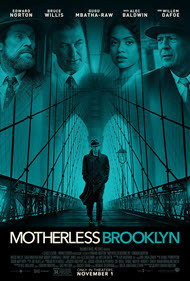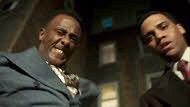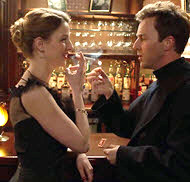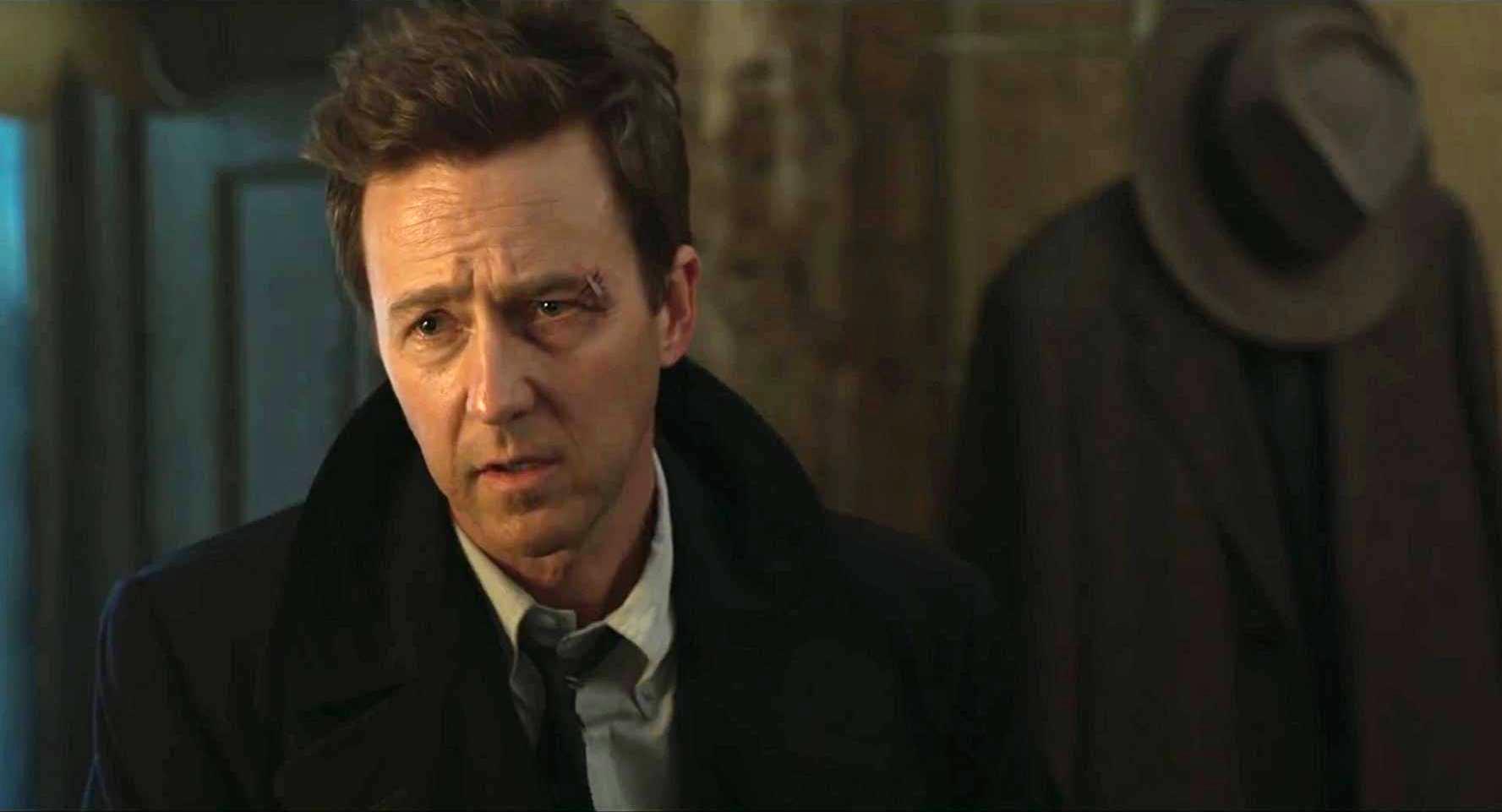Motherless Brooklyn
 for language throughout including some sexual references, brief drug use, and violence.
for language throughout including some sexual references, brief drug use, and violence.
Reviewed by: Keith Rowe
CONTRIBUTOR
| Moral Rating: | Extremely Offensive |
| Moviemaking Quality: |
|
| Primary Audience: | Adults |
| Genre: | Neo-Noir Crime Detective Mystery Adaptation |
| Length: | 2 hr. 24 min. |
| Year of Release: | 2019 |
| USA Release: |
November 1, 2019 (wide—1,342 theaters) DVD: January 28, 2020 |






Black and Latino families being evicted due to power hungry and greedy racist real estate developers
Political scandals
1950s New York City and its corruption
Abusive and sinful use of power
Attempting to bring corrupt officials to justice

Mobsters / organized crime
About death
Bigotry
RACISM—What are the consequences of racial prejudice and false beliefs about the origin of races? Answer
About the fall of mankind to worldwide depravity
What is SIN AND WICKEDNESS? Answer

Tourette syndrome
Being raised in a New York Catholic orphanage with nuns who tried to beat the bad language out of him
Overcoming personal fears and insecurities
Being courageous and persistant in trying to make a difference and fight for justice
| Featuring |
|---|
|
Edward Norton … Lionel Essrog—detective Bruce Willis … Frank Minna Gugu Mbatha-Raw … Laura Rose—an attorney Willem Dafoe … Paul Randolph Alec Baldwin … Moses Randolph Leslie Mann … Julia Minna Fisher Stevens … Lou Bobby Cannavale … Tony Vermonte Dallas Roberts … Danny Fantl Ethan Suplee … Gilbert Coney Josh Pais … William Lieberman Michael Kenneth Williams … Trumpet Man Cherry Jones … Gabby Horowitz See all » |
| Director |
|
Edward Norton |
| Producer |
|
Class 5 Films MWM Studios See all » |
| Distributor |
Based on the 1999 novel of the same name by Jonathan Lethem, “Motherless Brooklyn” is a neo-noir set in NYC during the 1950s. It’s a tale of murder, greed, scandal and political corruption. Some things never change.
The film opens with Lionel Essrog (Edward Norton), a private detective afflicted (or blessed) with Tourette’s Syndrome, assisting his boss, Frank Minna (Bruce Willis), with an important case. Things go sideways when Frank is taken for a ride, shot in the stomach and dumped in an alley. Frank’s final words not only hint at the identity of his murderer, they also blow the lid off a high-level political scandal.
As he begins unraveling the tangled web of corruption, Lionel meets Laura Rose (Gugu Mbatha-Raw), an attorney who’s advocating for the scores of minority families that are being forced out of their homes to make way for new housing developments. Lionel also encounters Paul Randolph (Willem Dafoe), a disgruntled engineer who implicates his brother, Moses (Alec Baldwin), as the chief architect of the unlawful land grab. These clues edge Lionel ever closer to the truth behind Frank’s death…and, as we learn in the opening sequence, once Lionel starts pulling on a loose string, he just can’t stop.
This is one of those films where it’s exceedingly difficult to remain impartial while evaluating it through the lens of faith. On the one hand, “Motherless Brooklyn” is a gorgeous film (Norton’s deft direction beautifully captures the look and feel of the 50s milieu) with superb acting from its scintillating cast and period appropriate production elements—sets, props, clothing and coifs are all crafted with excellence. On the other hand, the movie is loaded with foul language and crude speech from one set of credits to the other.
It’s unfortunate that the movie’s unsavory dialog ruins the worthwhile facets of its story. Its R-rating also prevents a broader audience from experiencing the movie’s remarkable central performance. Norton’s neck snaps and sudden outbursts never feel forced or rehearsed and are thoroughly convincing—an Oscar-worthy turn.
Lionel’s condition serves as a wild card element and produces sympathy in other characters (and the audience) when he apologizes for his behaviors (“I’ve got a condition…makes me say funny things”). Lionel’s ticks and quirks are the most interesting part of the movie. The same story with an average Joe detective would’ve made for a much duller film.
Negative Aspects
When considering the period the movie is set in, and the fact that Lionel frequents several night clubs to follow up on leads, it should come as no surprise that there’s a fair amount of smoking and drinking in the movie. At the detective agency, one character offers Lionel a drink from a flask. Lionel is shown abusing cannabis in a few scenes—he claims it helps with his Tourette’s symptoms. Lionel does occasionally consume alcohol, but in many scenes where he’s offered a drink, he shows a preference for tea.
Though the movie has no nudity or sex, a few scenes involve brief kissing. A couple is shown in bed together, but they are fully clothed and no sexual activity occurs. Lionel reveals he’s a virgin, which comes as a surprise to the woman he’s consoling. The woman walks around the room in a nightgown in one scene.
Despite the movie’s physical chastity, it’s inundated with improper sexual references. These salacious comments include several mentions of infidelity (“22 on the menu”) and a rape. The words “b*ng/b*nging,” “l*ck,” “s*ck,” “b*lls,” “t*ts,” “d*ck” and the F-word are all used to describe sexual acts.
There are a handful of violent scenes in the movie. A man is shot in the stomach—we see a bullet hole in his white shirt and blood expanding out from that point. After taking the wounded man to the hospital, Lionel lifts his blood-stained hand and places it on a doctor’s white smock, which leaves a bloody handprint. Midway through the movie, Lionel is beaten up in an alley outside a jazz club. A fellow detective is beaten up off-screen; he returns to the agency with facial bruises and scratches. A man is shot in the foot and some blood is shown, but the scene isn’t overly gory. The same man is forced off a tall building and we see him hit the ground. Some blood is seen pooling around his head, but the shot is at night and is from an extreme height.
Since the main character has Tourette’s Syndrome, it goes without saying that heavy swearing is a defining characteristic of the movie. While we can more easily forgive Lionel’s inappropriate outbursts, it’s harder to excuse other characters with a potty mouth (and there are plenty of them).
The movie has in excess of 60 f-words. It also has more than 25 s-words. A putrid potpourri of expletives pervades the movie, including: a—(9), a**hole (2), b*tch (9), cr*p (1), and p*ssed (1).
But it doesn’t stop there. Characters employ many profane or irreverent words as well. Such vain speech includes: J*sus (12), J*sus Chr*st (2), Chr*st (1), God-d*mn (5), G-d (2) and h*ll (5).
The movie also includes cut-downs and racial slurs galore. Lionel is repeatedly called “freak show.” Other digs include “clam brain.” The movie is permeated with such prejudicial terms as “colored broad,” “f*g and f*ggot,” and “cr*cker.”
If these negative elements haven’t dissuaded you from watching the film, be sure to take some time after the screening to renew your mind (Romans 12:2). “Motherless Brooklyn” definitely isn’t a Philippians 4:8 kind of movie.
Spiritual Aspects
Early in the story, Lionel mentions an unpleasant memory from his youth when a nun slapped his hand for swearing. Later in the movie, Lionel shares more experiences from his days at the Catholic school for boys, including how he got the titular nickname. From his remarks, it’s clear that Lionel’s overall view of the church is negatively skewed.
After Frank’s death, Lionel takes it upon himself to return Frank’s personal effects to Frank’s widow, Julia (Leslie Mann). Lionel’s coworker, Tony (Bobby Cannavale), tells him to “lie a little,” to keep Julia in the dark about how Frank died. Of course, acting on this advice would lead Lionel to break the ninth commandment (Exodus 20:16). Ironically, we later learn that Tony was having an affair with Julie while Frank was still alive, which puts him in violation of the seventh commandment (Exodus 20:14).
In adapting his screenplay, Norton has borrowed story devices from two of the finest movies ever made: “Chinatown” (1974) and “Citizen Kane” (1941). Even though they take place on the opposite coasts and are separated by a couple decades, the political corruption subplot in “Motherless Brooklyn” is reminiscent of the one in “Chinatown.” Whereas the dispute in “Chinatown” takes place over water, the civic upheaval in “Motherless Brooklyn” centers on the illegal appropriation of land.
There’s also a racial element here, since the people being forced from their homes are largely Blacks and Latinos. One character refers to the city’s renovation efforts as “a program for Negro removal,” which hints at a systematic relocation (and perhaps even genocide).
Norton added the character of Moses Randolph to Lethem’s original cast of characters. Randolph is based on Robert Moses, a controversial city planner who lived in NYC during the mid-20th century. Orson Welles also modeled his main character in “Citizen Kane” after a real-life figure: many feel that Charles Foster Kane was a thinly-veiled analog of newspaper mogul William Randolph Hearst. Norton’s use of the name Randolph would seem to be a tip of the hat to “Citizen Kane.”
One of the most poignant scenes in the movie is when Paul tells Lionel that his brother, Moses, is part of a “shadow branch” of our government—that no one voted him in and no one can vote him out. This is a frightening glimpse at the formation of the “swamp.”
Moses is the exemplar of the type of unelected bureaucrat that’s ruining our country. He’s completely remorseless over uprooting communities and honestly thinks his efforts are going to make things better for future generations. Moses believes that real power is when “not one person can stop you.” This proves beyond question that Moses has no compunctions about operating above the law. So steeped in narcissism and egomania is Moses, that he just gives a haughty smirk when someone burns an effigy of him at a rally with a sign that reads “Moses the Dictator!”
Paul is a man of good conscience, but he’s afraid of his brother. In the end, only Lionel has the fortitude to confront Moses. A person willing to stand up for what’s right also describes J. J. “Jake” Gittes (Jack Nicholson) in “Chinatown,” as well as Will Kane (Gary Cooper) in “High Noon” (1952). Of course, the ultimate example of someone defying evil, by sacrificing himself for the sins of everyone, was Christ (1 Peter 3:18).
Final Thoughts
“Motherless Brooklyn” is a well produced period piece with superb acting and directing. It’s a slow boil, hard-boiled crime yarn with flourishes of high art (the movie’s climax crosscuts between a taxi, a subway and a jazz club, where the band provides vigorous accompaniment for the entire sequence). It’s also a story that’s uber-salient with what’s transpiring in our government at present.
Early buzz for the film seems to indicate its potential to be in the hunt for Oscar’s top prize. Sadly, any accolades or awards the film receives will only perpetuate its objectionable content. It’s a shame that such a finely mounted production should be squandered on crass, profane and obscene material.
Lionel describes his condition as having glass in his brain. After enduring nearly two and a half hours of slow pacing, murky plotting and tasteless writing, I know exactly how he feels.
Instant classic or instantly forgettable? The jury is out.
- Vulgar/Crude language: Very Heavy to Extreme— • motherf***er (2) • other f-words (60+), including “How long have you been f***ing Julia?” and “f*** some colored girl” • s-words (25+) • “b*nging” and “b*ng” (sexual) • “suck d*ck” (1) • “d*ck” (1) • “t*ts” (5) • “a**hole” (2) • “a**” (9) • “b*tch” • “son of a b*tch” (9) • “cr*p” (1) • “p*ssed” (1) • “b*lls” (1) • “Colored broad” (1) • “f*ggot” and “f*g” • “Cr*cker” • a crass reference to a rape
- Profane language: Very Heavy— • “J*sus” (12) • “J*sus Chr*st” (2) • “Chr*st” (1) • “God-d*mn” (5) • “G*d ”(2) • “H*ll” (5)
- Violence: Moderate to Very Heavy
- Sex: no sexual acts, but heavy verbal references and brief kisses
- Drugs/Alcohol: Moderately Heavy
- Nudity: Minor
- Occult: None
Learn about DISCERNMENT—wisdom in making personal entertainment decisions
 Every time you buy a movie ticket or buy or rent a video you are in effect casting a vote telling Hollywood, “I’ll pay for that. That’s what I want.” Read our article
Every time you buy a movie ticket or buy or rent a video you are in effect casting a vote telling Hollywood, “I’ll pay for that. That’s what I want.” Read our article
See list of Relevant Issues—questions-and-answers.


PLEASE share your observations and insights to be posted here.

